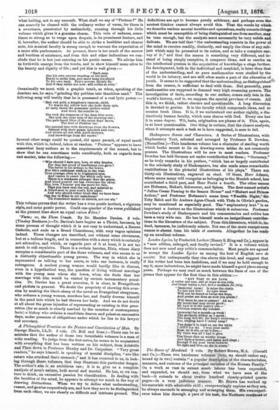Sonnets and Songs. By "Proteus." (John Murray.)—The world is ready
enough to listen to a now singer, if he has anything to say, even though the language in which the thoughts may be clothed is some-
what halting, not to say uncouth. What shall we say of "Proteus ?" Ho can scarcely be classed with the ordinary writer of verse, for there is a sweetness, penetrated by melancholy, running through his little volume which gives it a genuine charm. This vein of sadness, some- times so strong as to verge upon despair, is its prominent feature, and if, hereafter, the anther should be able to strike a healthier and clearer note, his musical faculty is strong enough to warrant the expectation of a more able performance. At present, there is too much of the sorrow and burthen of existence, and from this and other indications we con- clude that he is but just entering on his poetic career. We advise him to forthwith emerge from the tombs, and to show himself more alive to the beauty and dignity of life ; and yet this is well given :— " Each man Has his own sorrow treading on his heel, Beady to strike him, and must keep his shield To his own back. Fates arrows thickly fly, And if they strike not now, will strike at even."
Occasionally we meet with a graphic touch, as when, speaking of the desolate sea, he says, "grinding thy pebbles into thankless sand." The following song will testify that he is possessed of a real lyric power :—
Bed. red gold, a kingdom's ransom, child,
To weave thy yellow hair she bade them spin. At early dawn the gossamer spiders toiled And wove the sunrise in.
She took the treasures of the deep blue noon, She took the clear eyes of the morning star;
The pale-faced lilies of the seven days' moon, The dust of Phcebus' car.
She painted thee with dewdrops from the flowers, Stained with their petals, hyacinth and rose, And violets all wet with April showers, And snowdrops from the snows."
Several other Bongs could be quoted, did space permit, of equal merit with this, which is, indeed, taken at random. "Protons " appears to have somewhat hazy notions as to the requirements of the sonnet, but to show that he can sometimes write excellently, both as regards form and matter, take the following:— " Why should I hate you, love, or why despise, For that lest proof of tenderness you gave ? The battle is not always to the brave, Nor life's enblimest wisdom to the wise. True courage often is in frightened eyes, And reason in sweet lips which only rave. There is a weaktiess stronger than the grave, And blood poured out has overcome the skies. Nay, love, I honour you the more for this, That you have rent the veil, and ushered in A fellow-soul to your soul's holy place. And why should either blush that we have been One day in Eden in our nakedness ?
'Tis conscience makes us sinners, not our sin."
This volume proves that the writer has a true poetic instinct, a vigorous style, and agree poetic power. Could ono-quarter of the verse published at the present time show an equal raison d'être!































 Previous page
Previous page